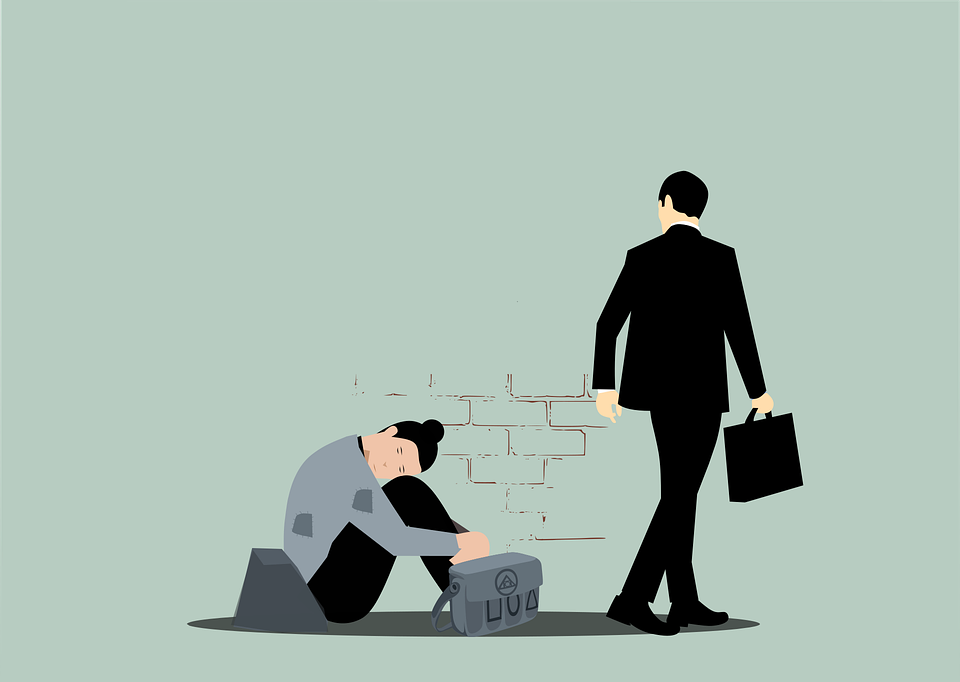Taxes, CEO's And Us: A Response

From time to time it happens that a discussion on noise and read can turn into something a bit more, such as this post which actually pointed to another read.cash article, that ultimately lead to this response.
I decided to respond here since I think it is an interesting discussion that more people may want to digest a bit. Beyond that, there are many misconceptions about businesses, their role, and why things are the way they are. This offers me yet another opportunity to share some thoughts on a topic I think can be helpful to offer some perspectives maybe you haven't considered.
I apologize if this one may get a bit long.
Without further adieu let's dive in a bit, shall we? I will do my best to keep things interesting even though this form of article and writing is outside of the normal course of things.
"When a business pays for expenses that’s a deduction for taxes, workers do not receive that. The purchasing power of the worker is down because when they purchase an item they are paying with their income which has been taxed and the tax on the item. The business doesn’t face tax on their expense only income."
—CryptoFrosted
While there is no denying that this is a true statement, we also have to understand the difference in the impact of what a business does vs. the impact of the individual. What the business is doing, regardless of the expenses it pays taxes on directly, is contributing enormously to the entire possibility of tax revenues.
Ultimately all of these activities will contribute to other businesses making a profit which they will have to pay taxes on, and contribute to payrolls which provide for the bulk of all collected tax revenues.
Without their activities there would be very little to collect.
Businesses are incentivized to do business and generate profits in order to provide a foundation for society as a whole to function and operate.
At the same time, individuals also receive many tax breaks and deductions, although of course not to the extent that businesses do. Again, because of the difference in what the business contributes to the whole vs. the individual's contribution.
Let's examine this just a little bit more.

A large part of the difference is to ask what is being produced by the spending? For an individual it is primarily consumption that is occurring. There is no "end benefit" once something is consumed. By contrast, everything a business spends on is a part of the machine that creates the profit which produces things that are crucially beneficial to everyone else functioning within it. The expense by the business has an "end benefit."
It does not make sense to allow an individual to deduct an expense on a dozen eggs that will only be eaten. But it does make sense to allow a business to deduct the expense of a dozen eggs if they will be used to make a product containing eggs that can then be sold, and produce jobs for those who work on the production line.
"If an owner, ceo etc receive part of their income in stocks, they are not taxed on those stocks. If the employees do not receive any stock their income still faces being taxed on their income and purchases. The owner, ceo or whatever can take a loan against their stock and spend that income but there’s an tax benefit in the form of a deduction. The worker are facing a double tax while those receiving stocks have not payed taxes on their income but rather have received more money in their income."
—CryptoFrosted
To examine this one we have to look beyond the question of taxes, and dig more into why CEO's are paid in the manner that they are.
Largely, a CEO is paid with a performance incentive in mind. In other words, it is better to have a CEO whose compensation is dependent upon the company's success as a whole than to simply put him into the "big chair" and hand him a hefty W-2 wage paycheck just so that he has to pay taxes on that in the same way we all do.
In other words, there is a disadvantage to direct W-2 compensation that can negatively impact the company's bottom line and can therefore also negatively impact all of the employees that are relying on their CEO's leadership for the source of their livelihoods.
If the CEO is a lousy one and just gets his $20 million, what does he care how well the company does? But if he is paid in shares of stock, or through stock options he can exercise, he has a very strong interest in doing well because potentially the value of his "rewards" are greater by doing so.
While "income" earned through stock options and stock rewards are not immediately taxable, surely they can become taxable events should the CEO ultimately sell his shares.
He may choose not to do so. This is true. He can borrow against these assets. This is also true. Even still, there may still be taxes owed through ownership—such as if the company pays a dividend, in which case the CEO will have to pay taxes on his dividend income.
Granted, the tax is less on dividend income than W-2 income. But it is still not a "tax-free" thing.
The money is not entirely tax free overall either. Even if the CEO held the shares to his last breath, eventually the money would be taxed (and at a much higher rate) through the wealth tax that occurs in the transfer of the holdings post-mortem.
Ultimately one can make the assertion that no money is ever completely tax-free in the grander scheme of things.

That "fair share" everyone worries so much about will eventually be paid one way or the other.
"Subsidies. You said it was the poor who received the bulk of these subsidies. Now some may argue welfare, hand out and subsidies as different but they are receiving financial benefit."
—CryptoFrosted
Subsidies of any kind, for me, are an area of contention. Regardless of who receives them, and often times regardless of why. The thing is, I believe fairly strongly in the concept of the free-market. I don't like it when the government picks winners and losers, and that goes for both corporate subsidies and subsidies offered to poor people in the form of social welfare programs.
The fact is that whenever you hand someone money for nothing, it changes the way they do business. Again, that goes the same for a company as it does for a poor person receiving some sort of government benefit. If someone has your back, so to speak, you are less inclined to be incentivized to do all you can to be successful.
I think it is enough for me to simply say that I do not like subsidies and leave it at that.
I will only add that there is an arguable greater "end benefit" to corporate welfare than personal welfare in that ultimately corporate welfare may produce something of value while personal welfare mostly does not.
Look, at the end of the day I think there is always one very big thing that is always missing from arguments we make about the level of taxation workers have to endure, and how money works, and what the impact of inflation is and so on and so forth.
That missing piece is "opportunity and participation."
Now, I am going to address this entirely from an American perspective, and we can probably lump in many other countries in the Western world to this. This will not apply in the same way in places like South Africa, Cuba, the Philippines, Venezuela and other countries.
A job is a job. That's all it is essentially. It is something to afford us the opportunity to go it alone and participate in all that is offered in this world that we live in. When we have a job, it our responsibility and our responsibility alone to ensure that we afford ourselves the chance to make a difference in our lives. In other words, it's a starting ground. We get our paycheck, the rest is up to us.
The fact is that most of us get too caught up in "how much" is in the paycheck and lose sight of how much opportunity our paycheck provides us if we participate. We look at a paycheck simply as a means to an end, rather than something bigger that can improve our lives beyond it. I talked about this a bit when I shared the story of a minimum wage Burger King worker who went on to become a multi-millionaire in "Onward and Upward."
It is not the responsibility of an employer to take care of us. That's our job. It's not the responsibility of an employer to even pay us a "liveable wage." Again, that's our job to choose professions that offer it, and to take the necessary steps to ensure we can have that opportunity.
Ultimately, your money is dependent on you. It is dependent on what you do. It is dependent on what opportunities you take advantage of and how much you participate in the economy and the opportunities afforded to you.
"You cannot produce good/service without labor...we are taking from the workers income in tax and taxing their spending dollar...add in a change of how and where we spend our dollars since Covid...we buy online at a much higher rate...spend more money on house repairs, tv, and other items to use in one’s home versus going to gyms, restaurants, vacations and other good/services...throw in a few tariffs and overall difficulty during Covid and you have higher prices but getting less for your dollar..."
—CryptoFrosted
Look, a guy starts a business because he wants to create something bigger than himself and be successful. He starts off like most of us do. At the bottom. The difference in what puts him in the big chair as opposed to where we sit is what he does. It's how he chooses to put his money to work to grow and become a bigger pile. We all share in that opportunity as my Burger King worker story illustrates.
Guys like this get where they get not by complaining about what someone else offers to them. Not by waiting for someone to give them something more. But rather by choosing to learn about all the ways that are out there to grow money and start businesses of their own.

They seize the opportunity and they participate, and this is what sets them apart from the rest of us.
But you also mentioned inflation. And yes, inflation impacts us all in negative ways. But again, there are opportunities to hedge against it. Not to sound like a broken record, but there again is where opportunity and participation determine our personal outcomes, and how well we can navigate something like inflation that we largely cannot individually control.
We can find ways to make more money, in other words. We can learn the art of frugality and learn the benefits of investing our money in things that grow rather than always spending it all on things that are simply consumed and have no lasting future value.
A lot of people will obviously say they can't afford to do these things because their financial situation falls short of their basic needs and therefore there is nothing left to take advantage of opportunities and participate.
My Burger King story is a glaring example of why that's simply not true. And over the years I have provided many examples of this not being true.
The bottom line is that when it comes to money, most people have simply conditioned themselves to think about it a certain way, and for them that's it. There is no other answer. It's hard to get people to wrap their head around the lie they have convinced themselves of. And once it is in their head and deeply rooted—uprooting that is almost an impossible thing.
But some people do finally realize it, and they are the ones who achieve greater things despite their odds.
"That’s why I don’t believe the majority of CEOs should be receiving millions while the majority receive crumbs. We gather the grained, we made it into flour and then into bread, yet they want the biggest pieces while they played golf."
—CryptoFrosted
The thing is, and I keep going back to this in multiple articles, is that CEO's are paid commensurate with what they produce, and regardless of how we feel as an employee about that, the fact is that the "crumbs" we get are commensurate with our contribution as well.
This statement I make is never to say to employees, "Hey, you're simply not worth anything." What I do say to the employee is, "Be honest with yourself about your worth and value while you are on the job."
Again, the activities of a CEO create hundreds of thousands, if not millions of jobs. It's not just the jobs they create within their own organizations. It's all the other jobs created by the business to business relationship that they have with other companies that they do business with.
And we are going to go back to something here. Opportunity and participation. Because CEO's provide for that as well. We can invest in their success and what they create by participating in the stock market that allows us to own a piece of their businesses.
When we talk about money, and the rich, and corporations we always tend to ask, "Why do they get to have it all while the rest of us are forced to struggle to do their bidding?"
Shouldn't we ask different questions?
How did they get there? What did they do? How can I get there? What can I do?
Warren Buffet was a newspaper delivery boy. Michael Bloomberg was a parking lot attendant. Steve Jobs started out as just a regular worker at HP. Jeff Bezos worked the grill at McDonald's. Ophrah Winfrey worked in a grocery store.
The thing is that none of these people let their jobs get in the way of their successes and none today view their lack of income when they started on their journey as a hinderance to their ability to succeed and achieve bigger and greater things.


